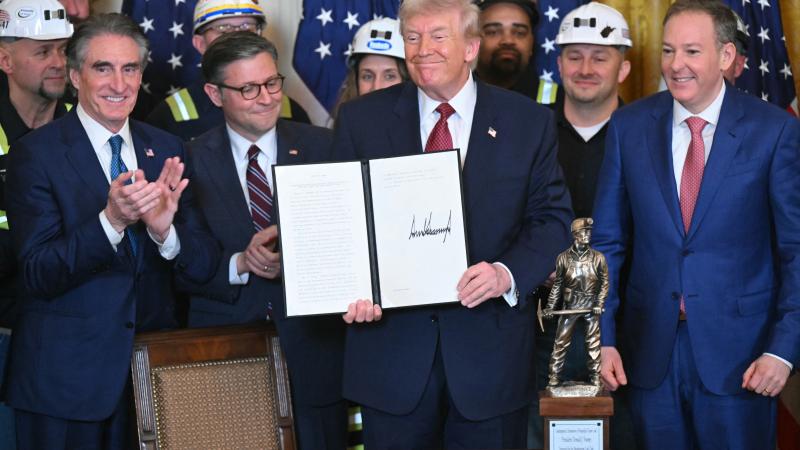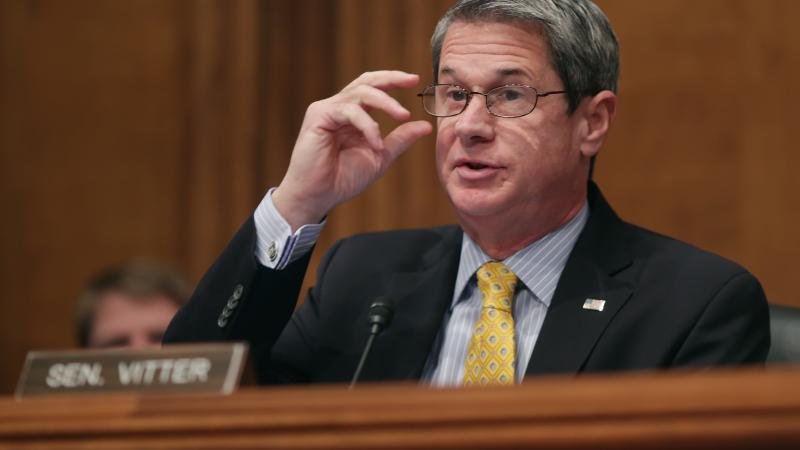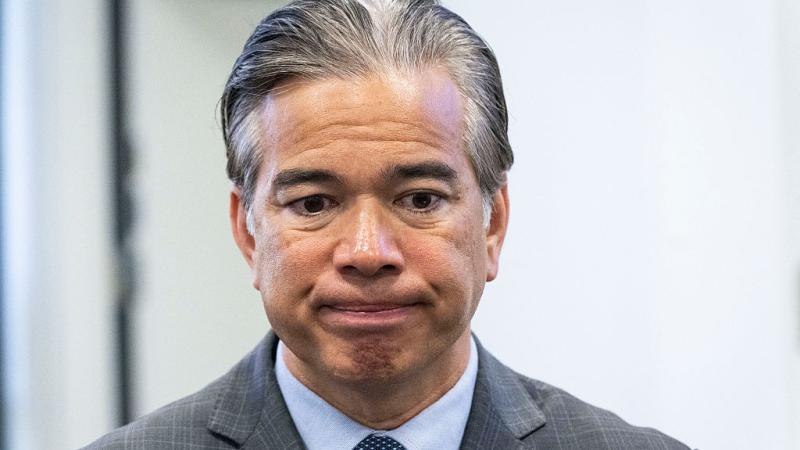Climate left put on heels with nuclear power, natural gas seen as necessary to fight energy crisis
Some environmentalists decry recent moves in U.S. and Europe, while others put pragmatism above ideology.
The push to transition completely away from fossil fuels to renewables such as wind and solar has hit a major roadblock on both sides of the Atlantic, with Europe and the U.S. increasingly — and in many cases reluctantly — viewing nuclear power and natural gas as keys to ensure energy security.
On Wednesday, the European Parliament voted to back European Union rules labeling some investments in natural gas and nuclear energy as "green," "sustainable," and climate-friendly.
The vote allows the EU to move forward with the plan, which will allow natural gas and nuclear power to be eligible for subsidies reserved for renewable energy.
The initiative appears in some ways to contradict the EU's long efforts to abandon its use of fossil fuels in favor of clean, renewable energy in a bid to reduce greenhouse gas emissions by at least 55% by 2030 and to become climate neutral in 2050. Europe has also closed several nuclear reactors in recent years.
Observers described the apparent 180 as a reality check as the global energy crisis intensifies and Europe weans itself off Russian energy following Russia's invasion of Ukraine.
"This was a slowly building crisis," said Myron Ebell, director of the Competitive Enterprise Institute's Center for Energy and Environment. "The Europeans had been pursuing policies to limit energy supplies and raise energy prices in the name of their climate agenda. Now they're desperate and scrambling to get out of this mess."
Perhaps most vulnerable of all is Germany, where orders for firewood and wood-burning stoves are backed up as supply runs short.
"They're trying to avoid freezing to death and even starving this winter" without relying on Russian energy, said Ebell.
Across Europe, several countries have banned fracking in the name of the green agenda, and Germany is still on course to switch off its three remaining nuclear power stations by the end of the year.
Meanwhile, Germany has spent nearly half a trillion dollars over the past two decades on windmills, solar panels, and a range of other efforts to transition from fossil fuels to renewables. In that time, Germany went from getting 84% of its primary energy from fossil fuels to 76%, according to scientist Vaclav Smil.
"And it only gets harder and more expensive from here," added Ebell, who explained green energy made the entire continent vulnerable. Wednesday's vote, he continued, is a "Band-Aid to heal a very large wound."
Ebell said the only way to actually get serious and reduce carbon emissions is to invest in nuclear energy over the long run, building many nuclear reactors because they provide power 24 hours a day. Nuclear power has zero emissions, although some critics worry about potential danger from storing nuclear materials.
The EU's decision Wednesday to include nuclear power in its energy plans is an "important step forward" as it seeks to achieve both its climate goals and energy security, according to the Nuclear Energy Institute.
"It illustrates the consensus opinion that existing and new nuclear generation are essential to global decarbonization efforts," said President and CEO Maria Korsnick. "The decision also demonstrates the critical role that nuclear carbon-free generation can play as countries seek greater energy security as the Russian Federation weaponizes energy production to influence the geopolitical landscape."
Supporters of the EU's shift note natural gas could replace coal as a source of energy. In the U.S., replacing coal-fired power plants with those fueled by natural gas has led to a 32% reduction in carbon emissions since 2005, according to data from the U.S. Energy Information Administration.
Still, many environmentalists, including some senior European officials, have decried Wednesday's vote as a setback in the fight against climate change.
Luxembourgish Energy Minister Claude Turmes, for example, tweeted that he "deeply regrets" the development and said Luxembourg and Austria will "press legal charges."
Climate activist Greta Thunberg also opined on the vote.
"This will delay a desperately needed real sustainable transition and deepen our dependency on Russian fuels," she wrote on Twitter. "The hypocrisy is striking, but unfortunately not surprising."
Several green groups blasted the decision as "greenwashing," or conveying an image of being environmentally friendly but not actually helping the environment.
Some observers said the Biden administration could learn something from the EU vote.
The move "reflects a growing recognition that the ongoing 'energy transition' is going to be far more complex and difficult to achieve than the overarching, simplistic narratives," David Blackmon, a Texas-based energy analyst and consultant, told CNBC. "The fact that a legislative body as environmentally-focused as the European Parliament has been now recognizes the role that both natural gas and nuclear must play to ensure the continent's energy security and stability is a welcome shift in outlook that should serve as an example worthy of emulation by the Biden administration."
President Biden infamously promised to "end" and "get rid of" fossil fuels while campaigning for president. Since entering the White House, he has said his goal is to create a "carbon pollution-free power sector by 2035 and net-zero emissions economy by no later than 2050."
By 2030, Biden further vows, the U.S. will cut fossil fuel emissions by 52% and half of all new vehicles sold in the U.S. will be electric.
In the process of implementing this vision, according to Ebell, the administration has hurt energy production.
"Every single thing the Biden administration has done in this area to make alternative forms of energy more competitive has limited oil and gas production and raised energy prices," he said.
In recent weeks and months, however, Biden has, like Europe, somewhat shifted his position. He has allowed additional natural gas exports to Europe, established a $6 billion fund to help troubled nuclear plant operators keep their reactors running, and held the administration's first onshore lease sales, also releasing a proposed plan for offshore drilling that could open parts of the Gulf of Mexico to leasing through 2028.
"Biden is coming up against political reality that people won't stand for this situation," as fuel prices remain historically high, said Ebell. "Europe is facing the physical reality hitting its climate agenda. Biden is facing the political reality."
As with Europe, environmentalists are decrying some of these changes as hindering the ability to combat climate change. Some green activists, however, appear to have blinked in their standoff with fossil fuel and nuclear power proponents, seeing little choice amid soaring energy prices and Russia's ongoing war in Ukraine.
Many skeptics of nuclear power, mainly Democrats, are now giving nuclear power a second look as they seek clean energy in a changing energy landscape.
As for natural gas, with critics questioning Biden's commitment to boosting domestic oil and gas production, some states are taking matters into their own hands.
Last week, New Hampshire Republican Gov. Chris Sununu signed into law a bill that encourages utilities to use renewable natural gas (RNG) as part of a long-term plan to reduce greenhouse gas emissions. The bill passed the Legislature with bipartisan support.
After RNG is processed, it can be used interchangeably with traditional natural gas. Environmental groups have raised concerns about the use of RNG, but state lawmakers and the state's utilities supported the bill.















